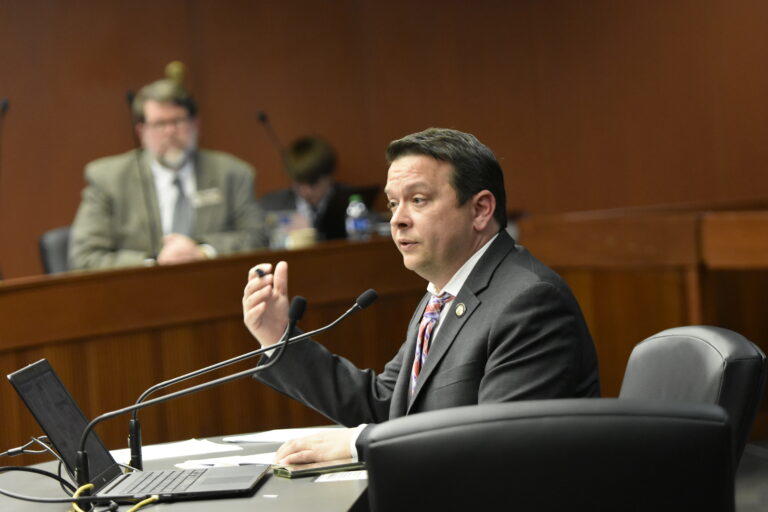
Caption
An image created by Midjourney AI program with the prompt “an image to go along with a news article about a state banning misleading ai-generated campaign ads leading up to an election.”
Credit: Midjourney AI photo illustration

An image created by Midjourney AI program with the prompt “an image to go along with a news article about a state banning misleading ai-generated campaign ads leading up to an election.”
The Georgia Senate is poised to pass a bill meant to stop political groups from using artificial intelligence to sway elections.
Woodstock Republican Rep. Brad Thomas’ House Bill 986 passed the Senate Judiciary Committee Monday thanks in part to the voice of a senator who was not in the room and does not support the bill.

A TV in a legislative committee room shows an image of Sen. Colton Moore and Freedom Caucus State Chair Mallory Staples along with a disclaimer that their voices promoting HB 986 were AI-generated.
“I would ask the committee, how is using my biometric data, like my voice and likeness, to create media supporting a policy that I clearly don’t agree with the First Amendment right of another person?” said the artificially-generated voice of Republican Sen. Colton Moore of Trenton. “What if I were to say, ‘I am Sen. Colton Moore and I’m running for Congress in Georgia’s 14th Congressional District?’ Now, that voice clip is spread across my history. The overwhelming number of Georgians believe the use of my personal characteristics against my will is fraud.”
Moore’s voice played over the speakers in the committee room while screens displayed a photo of him with a disclaimer saying that the voice was created by AI.
The vice chair of the conservative Georgia Freedom Caucus, Moore has spoken against the bill, including in a tweet with an AI-generated image of former presidential candidate Nikki Haley riding a pink rhinoceros in a swamp, a play on the term RINO, or Republican In Name Only.
Thomas said the posting rights of memesmiths like Moore would not be in danger if his bill became law. Instead, he gave the recent example of a political consultant accused of creating a deepfake of President Joe Biden’s voice and using it to robocall New Hampshire voters ahead of that state’s primary and telling them not to vote.
“That’s the type of issues that we’re concerned with, because when you create confusion about the administration of an election, that affects the integrity of our elections, and that’s what this bill goes through,” Thomas said. “As AI Colton very well said, it creates a crime to put this type of media out.”
The law would make people affiliated with “a political party, political body, candidate, campaign committee, political action committee, or any other political committee” liable for that crime if, within 90 days of an election, they publish, broadcast, stream or upload “deceptive” AI-generated media with the intent to deceive voters and influence the result of an election. If found guilty, they could be jailed for two to five years and fined up to $50,0000.
Campaigns would still be able to use AI in their ads as long as they include a disclosure with the name of the candidate or committee that created the media, the name of anyone being impersonated and statements that AI was used in the creation of the advertisement and that the events depicted may not have actually occurred.
The bill also contains exemptions for “satire, parody, works of artistic expression, or works of journalism by bona fide news organizations” as well as owners of platforms that may broadcast or host deceptive content such as broadcasters or streaming platforms.

Rep. Brad Thomas.
“I think we really do have to keep this bill really tightly written right now, and let me explain why, because I don’t doubt that there are potential First Amendment impacts if we make any changes,” he said. “Right now, political organizations, that we can tightly prescribe, but once you start bringing in private entities and companies, then the question becomes what are those protections for those, and now have we just created a First Amendment issue in a bill that I don’t believe has any First Amendment issues?”
Conservative writer and podcast host William Quinn testified that he already sees First Amendment issues.
“The concern here is that this bill speaks more to censorship,” he said. “And the reason it does is because, fundamentally, we have to maintain the constitutional rights for the U.S. Constitution and Georgia. And that’s why this is so critical.”
Quinn referenced a recent episode of the Tucker Carlson program that discussed election censorship.
“These concerns came out in Europe a number of years ago, and they criminalized certain types of speech,” he said. “Once we start going down that road, almost any type of speech is open to interpretation. Government is not going to be able to legislate thought, intent, or the outcome of certain actions during elections.”
Members of the committee did not seem persuaded, however. The bill passed nearly unanimously, with Senate Majority Leader Steve Gooch casting the only dissenting vote.
Both chambers began meeting last year to discuss how the state ought to respond to the quickly-developing technology. Lawmakers have also discussed crafting legislation to combat AI-related fraud.
The election bill is the highest profile AI-related legislation this session, but another bill seeking to ban AI-created child pornography also passed the Senate Judiciary Committee Monday and could be poised for a full Senate vote.
In a separate meeting Monday, the Senate Science and Technology Committee passed a bill requiring the Georgia Technology Authority to conduct an annual report of all artificial intelligence systems being used by state agencies and a resolution creating a Senate Study Committee on Artificial Intelligence. Committee Chair Ed Setzler, an Acworth Republican, said that committee will likely hold meetings after the session to plan for next year’s AI-related legislation.
The end of this year’s session and the deadline for any bill to pass both chambers is March 28.
This story comes to GPB through a reporting partnership with Georgia Recorder.